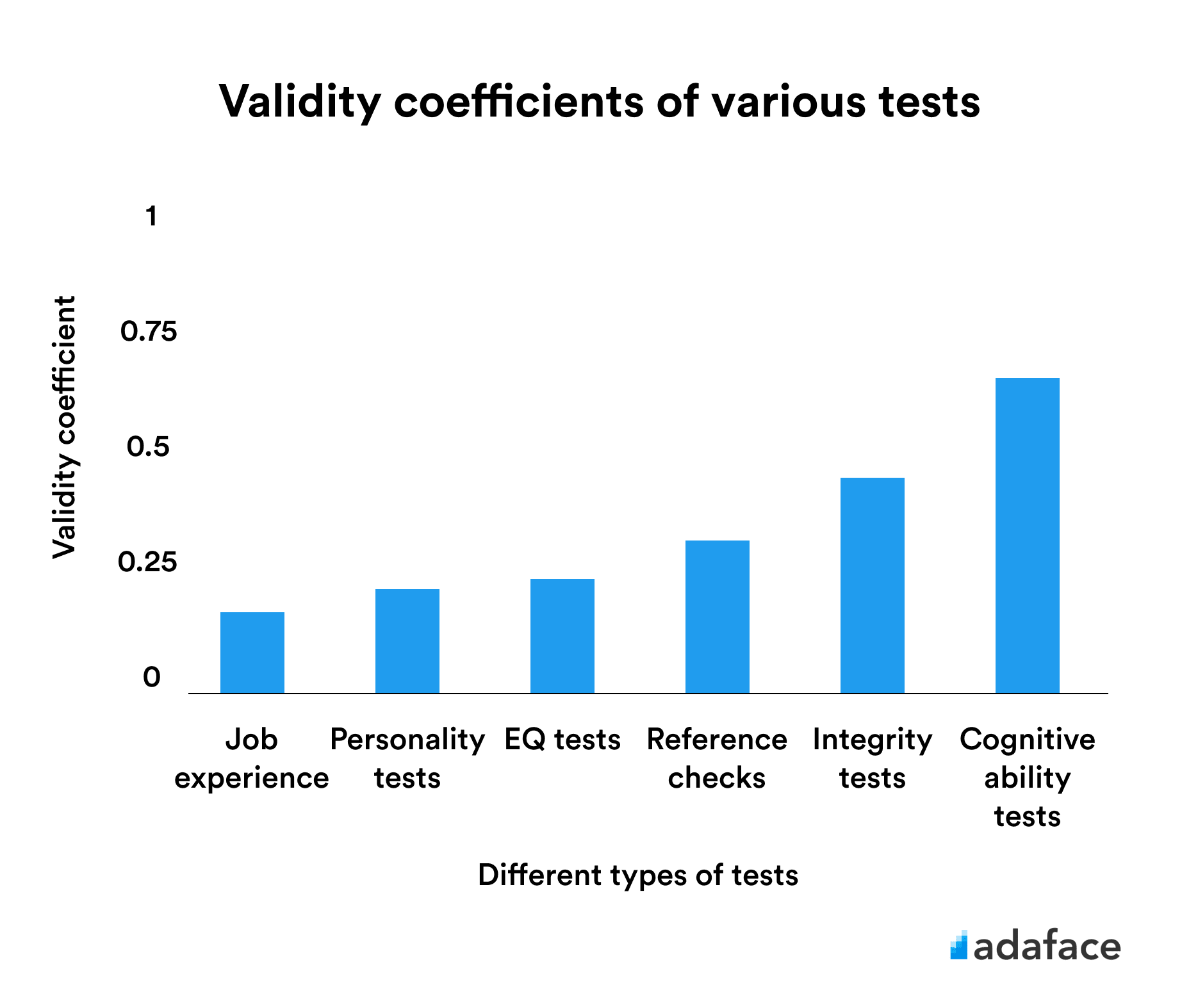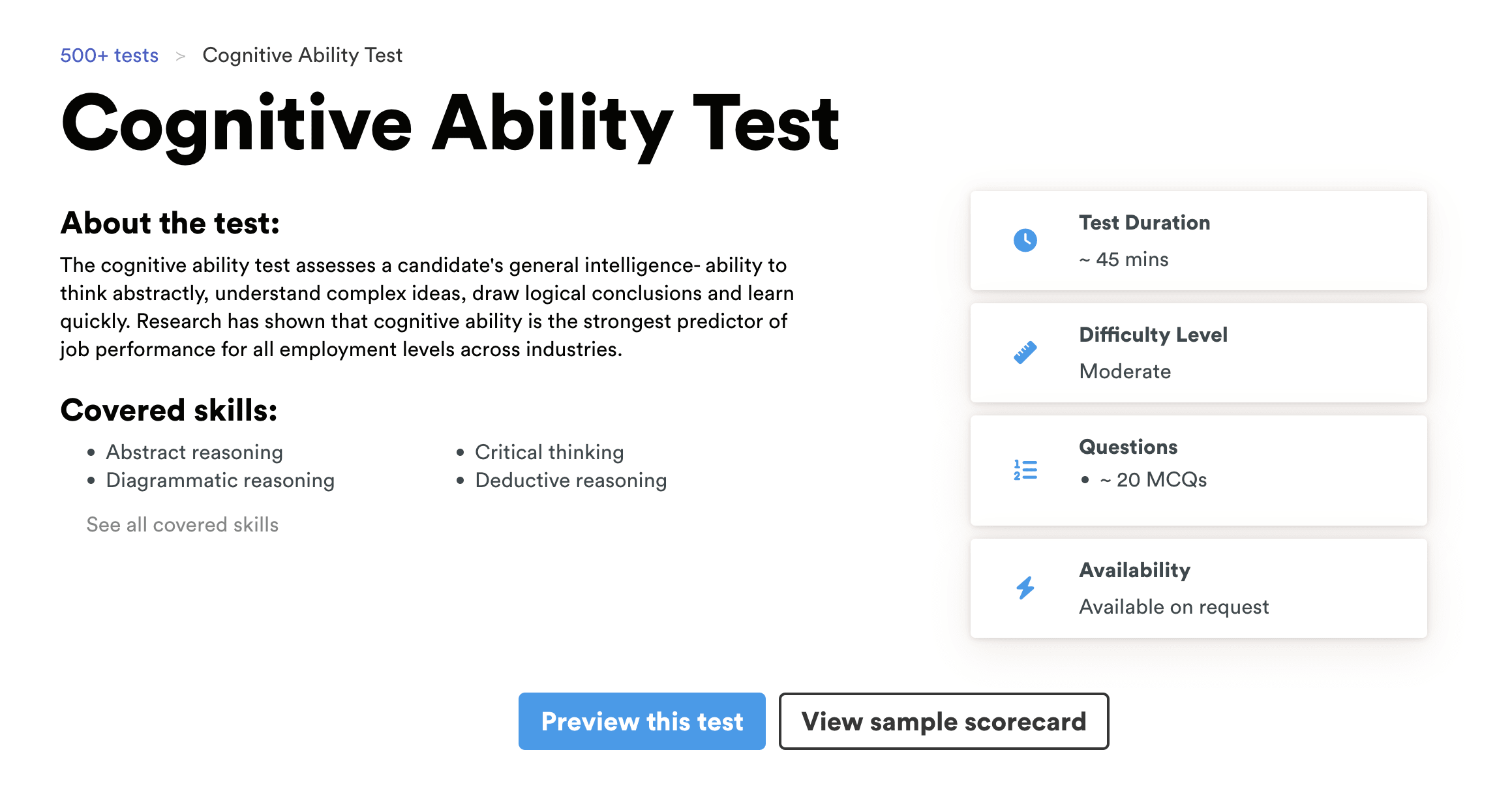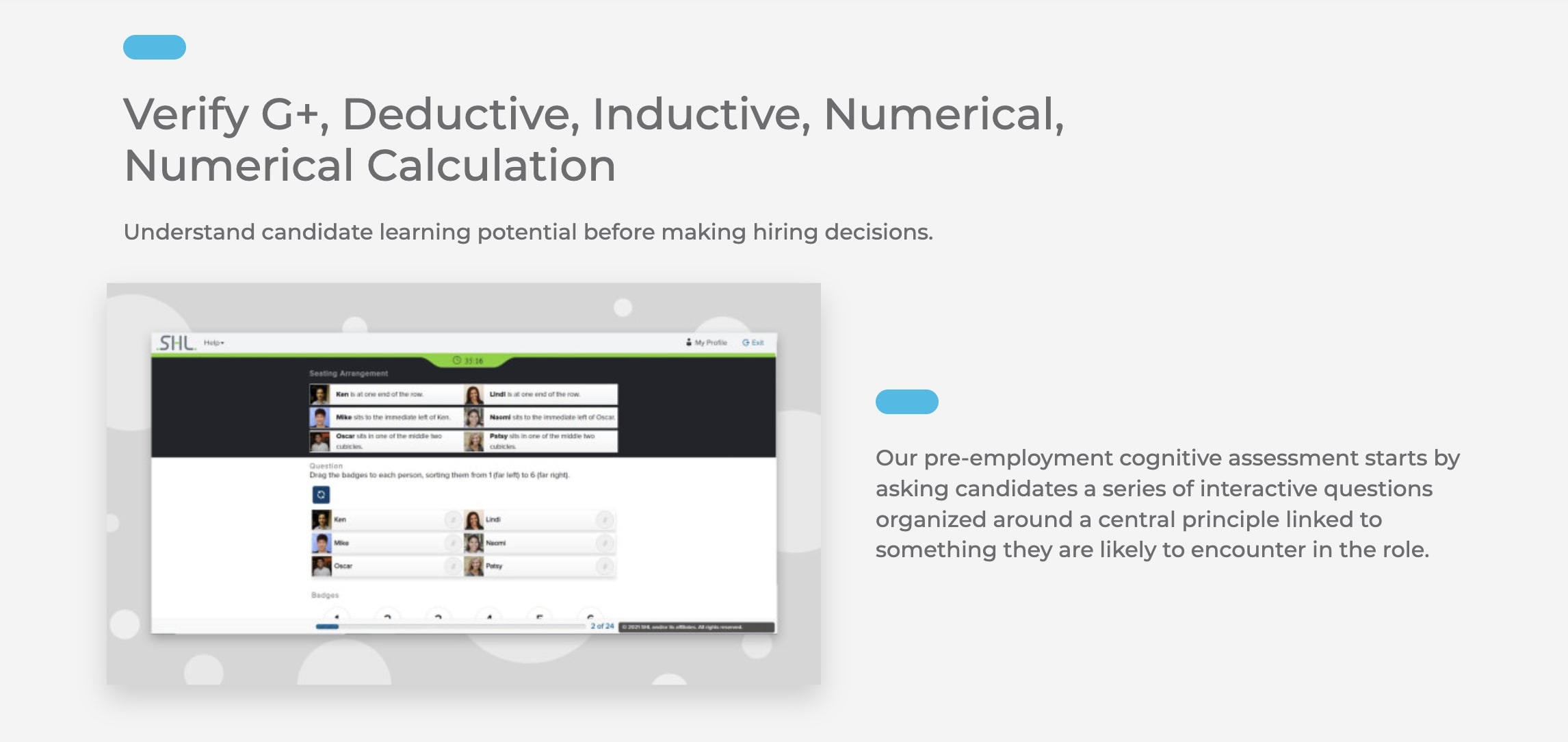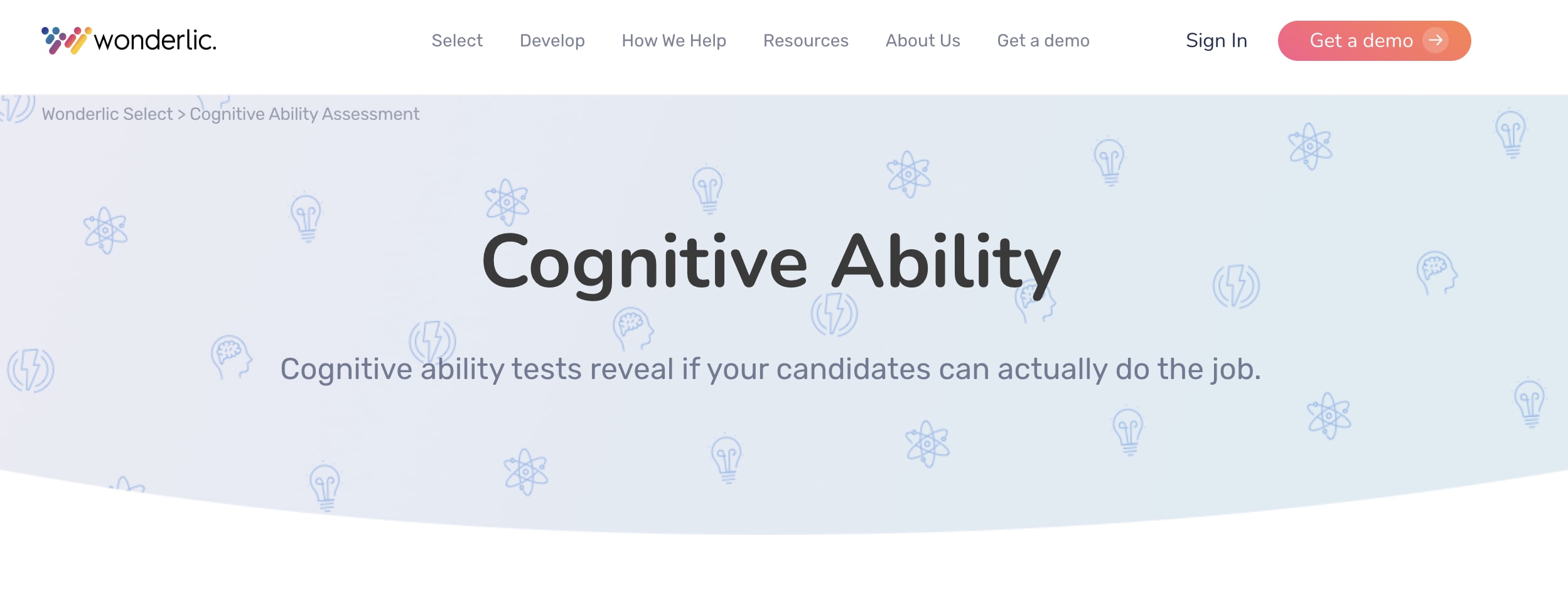

Have you ever wondered what lies beneath the surface when assessing someone's mental abilities? It's no secret that our cognitive abilities play a crucial role in our everyday lives and professional success. From problem-solving and decision-making to learning and adapting, our cognitive strengths shape how we navigate the world around us.
In this blog post, we'll dive deeper into cognitive ability assessments. We'll explore the different types of assessments available, delve into their validity and reliability, discuss their benefits to organizations, and highlight some top assessment tools worth considering.
What is a cognitive ability assessment?
A cognitive ability assessment is basically a fancy way of saying a test that measures how well your brain works.
A cognitive ability assessment is a tool or set of tests designed to measure a person's cognitive capabilities and mental skills. It aims to evaluate various aspects of cognitive functioning, such as reasoning, problem-solving, memory, attention, and critical thinking.
In the working world, companies use them during the hiring process to figure out who's got the right smarts for the job and can tackle tough challenges like a boss.
Studies show that workers with higher cognitive ability tend to have higher productivity levels and earn higher wages compared to their peers with lower cognitive ability.
Types of cognitive ability assessments
There are various types of cognitive ability assessments that are used to measure different aspects of cognitive functioning:
- Verbal reasoning: How well can a candidate comprehend and process written information?
- Numerical reasoning: How well can a candidate understand and apply numerical concepts?
- Analytical reasoning: How well can a candidate reason and solve problems analytically?
- Abstract reasoning: How well can a candidate identify patterns and relationships between concepts?
- Creativity assessment: How well can a candidate think creatively and generate new ideas?
- Logical reasoning: How well can a candidate analyze and evaluate arguments logically?
- Spatial reasoning: How well can a candidate understand and analyze visual information?
- Memory assessments: How well can a candidate recall and retain information?
No matter which test you employ, it measures some form of cognitive ability of a candidate. Based on the role and requirements of each specific position, it is essential to select and administer the most appropriate test.
For example, if you are hiring for a data analyst role that requires strong numerical reasoning and data interpretation skills, administering a Numerical Reasoning Test would be beneficial to assess candidates' quantitative aptitude and ability to work with numbers effectively.
Validity and reliability of cognitive ability assessments
When it comes to cognitive ability assessments, two important factors we need to consider are validity and reliability. Validity basically tells us if the test actually measures what it claims to measure, while reliability tells us if the test is consistent and dependable.
Validity: In the case of these tests, we're interested in how well they can predict job performance. A high validity coefficient means that the test is strongly related to how well someone will perform on the job. So, the higher the validity coefficient, the better the test is at predicting job performance.

Reliability: If the test is reliable, it means that if we were to administer the same test to the same candidate multiple times, we would expect to get similar results each time. This is important because we don't want the test to be influenced by random factors or fluctuations. We want to be able to trust the results we get.
To gain a deeper insight into the importance of reliability and validity in pre-employment assessments, check out our extended blog post on test reliability and validity.
Benefits of cognitive ability assessments
At least 80% of the Fortune 500 companies globally use cognitive and IQ tests during the hiring process.
- Predicting job performance: Cognitive ability assessments have been found to be strong predictors of job performance across a wide range of roles and industries. Higher cognitive abilities, such as problem-solving, critical thinking, and learning agility, are often associated with better job performance.
An analysis by Schmidt and Hunter (2018) affirmed the strong validity of cognitive ability tests, reporting an average validity coefficient of 0.53 across a range of jobs, including professional, technical, and clerical occupations.
- Objectivity and standardization: Cognitive ability assessments provide an objective and standardized way to evaluate candidates. These tests are designed to measure specific cognitive skills and are administered in a consistent manner to all applicants.
- Reduced turnover and training costs: By assessing cognitive abilities during the hiring process, organizations can make more accurate predictions about a candidate's potential for success in a specific role. This alignment between candidate abilities and job requirements can result in reduced turnover rates and lower training costs.
Organizations that use cognitive ability tests in their selection processes experience a 20% reduction in turnover compared to organizations that do not use such assessments.
- Personalized development and training: Cognitive ability assessments can also inform personalized development and training plans for employees. By understanding individual cognitive strengths and areas for improvement, organizations can tailor development programs to enhance employees' specific cognitive skills, promoting professional growth and maximizing their potential.
Top 7 tools for cognitive ability assessments
Adaface
The Adaface Cognitive Ability Test assesses a candidate's general intelligence – the ability to think abstractly, understand complex ideas, draw logical conclusions and learn quickly.

This test provides a comprehensive and detailed score breakdown that sheds light on the candidate's performance across various cognitive abilities, such as spatial reasoning, numerical reasoning, and more.

Imagine you're seeking a candidate for a position that heavily relies on spatial reasoning skills. With the detailed score provided by the Adaface test, you can quickly pinpoint candidates who have achieved higher scores in spatial reasoning. This enables you to shortlist individuals who possess the cognitive abilities most relevant to the role, ultimately increasing the chances of finding the perfect fit.
SHL
SHL's cognitive ability assessment is a highly regarded and widely utilized tool in pre-employment testing. This assessment measures an individual's cognitive aptitude and critical thinking skills, providing valuable insights into their problem-solving abilities, numerical reasoning, verbal comprehension, and logical reasoning.

With a comprehensive range of test formats and tailored solutions for various job roles and industries, SHL's cognitive ability assessment enables organizations to make informed decisions when selecting candidates, ensuring a better match between job requirements and individual capabilities.
Mettl
This assessment provides valuable insights into candidates' reasoning skills, problem-solving abilities, numerical and verbal aptitude, and logical thinking.

With a user-friendly interface and customizable test options, Mettl's cognitive ability assessment enables organizations to identify top talent, make informed hiring decisions, and ensure a strong alignment between job requirements and candidate capabilities.
Criteria cognitive aptitude test (CCAT)
The CCAT measures a candidate's cognitive abilities, including problem-solving, critical thinking, and learning abilities. With a focus on speed and accuracy, the CCAT assesses an individual's aptitude in numerical reasoning, verbal comprehension, and logical thinking.

Its adaptive nature adjusts the difficulty level of questions based on the candidate's responses, ensuring an accurate assessment of their cognitive capabilities. The CCAT provides employers valuable insights to make informed hiring decisions, identify high-potential candidates, and predict future job performance.
Wonderlic
Renowned for their efficiency and accuracy, these tests evaluate an individual's cognitive aptitude, problem-solving skills, and ability to learn and adapt quickly. Wonderlic's cognitive ability tests cover a range of areas, including numerical reasoning, verbal comprehension, logical thinking, and spatial reasoning.

McQuaig mental agility test (MMAT)
The McQuaig Mental Agility Tests (MMAT) are well-regarded assessments used in pre-employment testing to evaluate an individual's mental agility and cognitive abilities. These tests measure a candidate's capacity for logical reasoning, problem-solving, and critical thinking skills.

TalentLens
TalentLens's DAT (Differential Aptitude Tests) assessments provide valuable insights into a candidate's intellectual potential, problem-solving skills, and ability to learn new concepts.

Making smarter choices with cognitive ability assessments
We've explored the world of cognitive ability assessments and discovered how they could be a game-changer in hiring and talent management.
By utilizing cognitive ability assessments, you gain a powerful tool that goes beyond traditional hiring methods. You can accurately predict job performance, ensure fairness and objectivity, efficiently screen candidates, and identify those with the potential to excel in their roles. The data-driven nature of these assessments brings a level of precision to your decision-making process, saving you time, resources and, ultimately, reducing turnover.
With a strategic approach, you're well on your way to assembling a team of exceptional talent that will drive your organization forward into a bright future!

Pragnesh is the EiR at Adaface. He loves reading books more than scrolling through social media, which is a big deal if you ask him.
Spending too much time screening candidates?
We make it easy for you to find the best candidates in your pipeline-
with a 40 min skills test.


